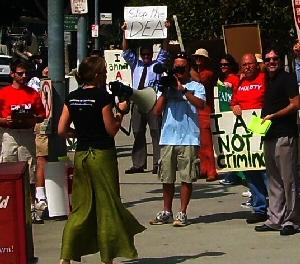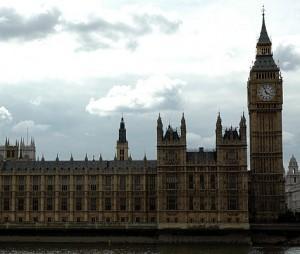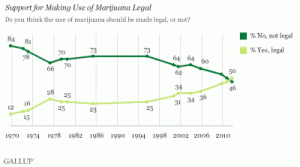The skies over California's medical marijuana industry may be dark and stormy, but the feds can't keep the sunshine away forever, well-placed activists say.
Britain's governmental Advisory Council on the Misuse of Drugs has once again called for the decriminalization of drug possession. Once again, the British government doesn't want to listen.
Half of all Americans now support marijuana legalization, according to the latest Gallup poll. There is majority support in every region of the country except the South.
California's largest doctors' group has called for marijuana legalization, making it the first in the nation to do so.
The feds are backing up last week's medical marijuana threats with actions -- sometimes by themselves, sometimes with the DEA working in tandem with local officials.
The feds continue their war on medical marijuana distribution in California, with two new DEA raids Monday and the use of asset forfeiture threats to shut down eight dispensaries in Orange County.
Every two years drug policy reformers from across the United States and around the world come to the International Drug Policy Reform Conference to listen, learn, network and strategize together for change. This year the conference is in Los Angeles, November 2-5, and StoptheDrugWar.org is a partner.
Mexican President Calderon admitted this week that the state of Veracruz had been left to the cartels. Meanwhile, the killing continues without let up.
NYPD narcs routintely planted drugs on innocent people, a former narc testified in court this week. That's a shocker -- not.
A quiet week on the corrupt cops front this week, with only two reports. But one of them raises interesting questions: Why does a drug task force commander who steals from suspects and tries to cover up his crimes only get probation, when suspects potentially face prison?
An Illinois man died in police custody after swallowing drugs during a drug arrest. The death comes only weeks after the city paid out big for letting a man die in similar circumstances last year.
The Drug Policy Alliance is hiring a new Policy Associate for the Office of National Affairs in Washington, DC.
The ongoing federal offensive against medical marijuana production and distribution in California is weighing ominously over the state's billion-dollar-a-year medical marijuana business, but while the industry could take some casualties, patients could suffer, and the battle field could get ugly, the feds can't stop it, a trio of well-placed activist observers said this week.

medical marijuana protest, 2006 (photo courtesy ASA)
Despite the Obama administration's famous 2009 Justice Department memo saying it would not interfere with operations complying with state laws in states where it is legal, the federal government has been raiding medical marijuana operations at a pace faster than the Bush administration. This year, the administration has become evidently more hostile, with a range of federal agencies doing what they can to make life difficult.
The Treasury Department has been scaring financial institutions away from dealing with medical marijuana businesses, the IRS is exercising punitive tax policy decisions designed to run them out of business, and even the Bureau of Alcohol, Tobacco & Firearms has gotten into the act, warning gun dealers that medical marijuana patients are "addicts" who can't legally purchase weapons.
Tax liens and banking hassles are one thing, but being confronted by
paramilitarized DEA raiders, threatened with having properties seized, or being faced with lengthy federal prison sentences is a whole other category of hurt. And that's what really has California's medical marijuana community up in arms. Between threatening news conferences by federal prosecutors, dozens of warning letters to landlords going out, and a steady drumbeat of DEA raids, medical marijuana patients and providers are scared -- and angry.
"I haven't seen people so outraged since the days of
WAMM and the Ed Rosenthal raids," said long-time
California NORML head Dale
Gieringer. "I'm hearing life-long Democrats say they can't vote for this -- unless Obama does something, he's going to lose a lot of support. I know people who gave a lot of money to his campaign last time who are sitting on their cash now."
That anger is taking to the streets, as well as the phone lines and the Internet. There will be a statewide protest at the federal courthouse in Sacramento as well as other federal courthouses on November 9, local demonstrations have already taken place in San Francisco and San Diego, with more scheduled around the state, and plans are in the work to protest President Obama when he visits San Francisco and Los Angeles next week.
"There's a lot going on," said
Gieringer. "I can't keep track of it all."
Activists already held a White House call-in day on Tuesday, and
Gieringer urged people to call their US representatives to urge them to support
H.R. 1983, the States' Medical Marijuana Protection Act.
"That would solve this problem," he said. "We really need to focus on Congress, but we also need to try to get something from this administration."
Americans for Safe Access (
ASA), the country's largest medical marijuana advocacy group, is deeply involved in waging the counteroffensive. It has sent out email action alerts to members and is mobilizing on the ground and at the courthouse as well, said spokesman Kris Hermes.
"
ASA and other stakeholders are holding protests throughout California," he said, "and we intend to continue to apply pressure through the federal courts. At some point soon, we will file an appeal on the federal rescheduling petition case, and we'll be going head to head with Obama on that issue. Because the Obama administration is drawing so much attention to this, something has to break. We hope it leads to a more sensible public health policy."
But despite the angst aroused by the intensifying federal campaign, and despite acknowledging the real suffering likely to result -- from patients being denied medicine to local governments denied revenues to otherwise law-abiding citizens being subjected to federal raids and prison -- advocates said the federal campaign was ultimately doomed to failure.
"It's a serious threat in the sense that it will have an impact on the number of dispensaries and growers across California, and that will translate into hundreds if not thousands of patients being denied their medication and forced into the illicit market,"
ASA's Hermes. "I don't think that's the intention, but it will certainly be the effect."
But, citing the Bush administration's 2007 threat letter campaign, when warning missives went out to more than 300 landlords, resulting in the closing of some dispensaries, Hermes said the feds were fighting a losing battle.
"They don't have the resources or capacity to follow through on their threats, so there will be an impact, but it will be temporary," Hermes said. "When Bush did it, dozens of dispensaries shut down, but now there are twice the number of dispensaries in the state that there were then. It will be difficult for the feds to have a lasting impact, which is not to say they're not trying. And they're mounting this campaign on the backs of taxpayers."
"We've been through this before," sighed Cal
NORML's Gieringer, citing not only the Bush threat letter campaign, but also the 2002-2003 crackdown under then Attorney General John
Ashcroft, and the 1998 Clinton administration lawsuit against the Oakland Cannabis Buyers' Co-op.
"Every time, we've seen some damage done and some retrenchment, but every time the industry has come back stronger than ever in a year or two. I'm not sanguine about it," he said, "just used to being outraged. The government has a bankrupt policy that it can't really enforce very effectively. A lot of good people could get sent to prison, but at the end of the day, they're just flailing around."
Richard Lee, founder of
Oaksterdam University, owner of one of Oakland's dispensaries, and the man who put his personal fortune into last year's Proposition 19, has spent years looking over his shoulder for the feds. This is just another twitch of the dying dinosaur's tail, he said.
"We're always worried," Lee laughed
mirthlessly. "But in the end, we'll win. There is too much for them to take out everybody. There will be sacrifices, people will be hurt, but now we have an army to fight back. In the long run, this just pushes us toward legalization."
Oakland also has a friendly city government and a history of pro-legalization voting, Lee pointed out in an oblique warning to the feds. "Here in Oakland, we passed Measure Z with 65% of the vote, and that made possession
and sales by adults and patients the lowest law enforcement priority," Lee pointed out. "Right now, we have six or so Measure Z clubs open. If they shut down the dispensaries, there will be a lot more of them."
Not only did Oakland pass Measure Z, which directed city officials to lobby for complete legalization, Lee pointed out, it also overwhelmingly passed Proposition 19.
"We're well on record for complete legalization, and the city needs the tax money more than ever," he said. "This is an ongoing battle between local governments here and the feds, and tax dollars is part of this fight. Right now, it's got us the worst of both worlds -- prohibition and taxation -- but hopefully one day we'll get taxation with legalization. There's certainly an incentive for local governments."
Landlords may tremble, dispensaries may close, people may go to prison. Medical marijuana and pot legalization supporters will fight in the trenches, though, and they are confident time and the tides are on their side. But only time will tell if they are right.
back to top
The British government has once again ignored the advice of the government panel empowered to advise it on drug policy issues and is maintaining a stalwart, if terse, defense of the continuing criminalization of drug users. The Conservative-led coalition government headed by Prime Minister David Cameron -- a one-time legalization advocate -- is rejecting a renewed call from the Advisory Council on the Misuse of Drugs to decriminalize drug possession.
The
ACMD is a panel of experts created by the 1971 Misuse of Drugs Act "to keep drug misuse in the United Kingdom under review, and to advise the government on measures for preventing misuse and social problems arising from it." But both Labor and Tory governments have ignored the advice of the
ACMD when that body has recommended reformist measures, whether it be downgrading the seriousness of marijuana offenses, properly scheduling drugs like Ecstasy, or, in the present case, calling for decriminalization as a smarter approach to drug possession.
The
ACMD had called on the government to move toward decriminalization last year in its
submission to the national drug strategy consultation, concluding that persons arrested for the possession of any drug "should not be processed through the criminal justice system but instead be diverted into drug education/awareness courses." Because that advice did not fit the "tough on crime" politics of the Tories, it was ignored.
This month, the
ACMD reiterated its support for decriminalization, forcing the government to react. The venue for the renewed call was the
ACMD's submission to the Sentencing Council, another governmental body charged with reviewing sentencing practices. Oddly enough, whether drug possessors should even face criminal sanctions was beyond the Sentencing Council's remit, but that didn't stop the
ACMD from making its point, using language almost identical to that in last year's national drug strategy submission.
"The
ACMD also believes that there is an opportunity to be more creative in dealing with those who have committed an
offence by possession of drugs," the advisors wrote. "For people found to be in possession of drugs (any) for personal use (and involved in no other criminal
offences), they should not be processed through the criminal justice system but instead be diverted into drug education / awareness courses with concomitant assessment for treatment needs, or possibly other, more creative civil punishments… Such approaches may be more effective in reducing repeat offending and reducing costs to the criminal justice system. There should be 'drugs awareness' courses to which those found in possession can be referred as a diversion. These could also be available to those being conditionally cautioned where there is evidence of drug use."
The
ACMD noted that similar diversion programs are used other sorts of offenses, such as traffic.
Media notice of the
ACMD's recommendation forced the government to respond, but the Home Office was having none of that decriminalization talk. In a statement released Friday, the Home Office made clear it was not listening to its drug advisors.
"We have no intention of liberalizing our drugs laws," the Home Office said. "Drugs are illegal because they are harmful -- they destroy lives and cause untold misery to families and communities. Those caught in the cycle of dependency must be supported to live drug-free lives, but giving people a green light to possess drugs through decriminalization is clearly not the answer. We are taking action through tough enforcement, both inland and abroad, alongside introducing temporary banning powers and robust treatment programs that lead people into drug-free recovery."
But that position, arrived at by the coalition-dominating Conservatives, is leaving some open space between them and their junior partners, the Liberal Democrats. Just last month,
the Liberal Democrats passed a resolution calling for the decriminalization of drug possession and the regulated distribution of marijuana. Still, with Labor continuing to pursue a feckless policy of not touching drug reform, especially after its debacle with downgrading, then upgrading marijuana offenses, the Liberal Democrats are isolated on the issue among the country's major parties.
But, given the rising clamor for more humane and effective drug policies, not only from the
AMCD and governing coalition junior partners, but also from the
Global Commission on Drug Policy and an ever-increasing number of civil society groups, it appears the Conservative government's response to demands for positive change amount to clapping its hands over its hears and chanting, "
Nyah!
Nyah! We can't hear you!" Except you know they're saying that because they actually do hear you.
back to top
Support for marijuana legalization in the US continues to climb, with the Gallup Poll reporting Monday that a record high 50% of Americans now approve of freeing the weed. That's up from 30% in 2000, 40% in 2009, and 46% last year.
But pot legalization remains a divisive subject. Nearly half -- 46% -- of respondents opposed legalization, with only 4% either undecided or not answering the question.
When Gallup first began asking the marijuana legalization question in 1969, only 12% approved and 84% opposed. Approval figures hovered in the mid-twenties from the late
1970s to the
mid-1990s before beginning the current upward climb.
In line with other national polls, the current Gallup poll found support for legalization strongest among liberals (69%), 18-29-year-olds (62%), and moderates, Democrats, and independents (57%). Men (54%) and 30-49-year-olds (56%) also showed majority support for legalization.
Those demographic groups least like to favor marijuana legalization were people over 65 (31%), conservatives (34%), Republicans (35%), and women (46%).
Geographically, marijuana legalization had majority support in the West (55%), the Midwest (54%), and the East (51%). The only region not showing majority support for legalization was the South, where only 44% approved.
Especially in the West, these numbers will bring some solace to legalization campaigners. Organizers in at least four states -- California, Colorado, Oregon and Washington -- are working toward placing legalization initiatives on state ballots, and these numbers suggest they are within striking distance of victory, even if not within the 60%+ approval comfort zone of initiative veterans.
As Gallup itself noted, "Support for legalizing marijuana has been increasing over the past several years, rising to 50% today -- the highest on record. If this current trend on legalizing marijuana continues, pressure may build to bring the nation's laws into compliance with the people's wishes."
The poll was conducted by telephone interviews on October 6-9. The sample was a random sample of 1,005 adults 18 or older living in all 50 states and Washington, DC. The margin of error is +/- 4%.
back to top
California's largest doctors' group is calling for marijuana legalization. The trustees of the California Medical Association (CMA) adopted the position at their annual meeting in Anaheim Friday. The call came after the group last year decided to study the issue and make recommendations.
The group, which represents more than 35,000 physicians statewide, called for legalization even as it acknowledged health risks and questioned the medical value of pot.
The CMA's policy recommendations on marijuana included rescheduling marijuana in order to encourage further research, regulating recreational marijuana "in a manner similar to alcohol and tobacco," taxing marijuana, and facilitating information about the risks and benefits of marijuana use.
Dr. Donald Lyman, a Sacramento physician who authored the new policy, wrote that the new policy was inspired by frustration with California's medical marijuana law. The law permits marijuana use with a physician's recommendations, even though marijuana remains illegal under federal law. That puts doctors in an untenable position, Lyman argued.
"It's an uncomfortable position for doctors," he told the
Los Angeles Times. "It is an open question whether cannabis is useful or not. That question can only be answered once it is legalized and more research is done. Then, and only then, can we know what it is useful for."
But despite questioning marijuana's medical efficacy, the CMA made it clear that it sees pot prohibition as a failure. "The California Medical Association (CMA) has recognized that the
criminalization of cannabis is a failed public health policy," Lyman wrote in the white paper. "Based on the growing momentum of medical cannabis decriminalization nationally (16 states and the District of Columbia have decriminalized medical cannabis), there may also be growing public support in several states for decriminalization of the cultivation, transport and use of cannabis."
The CMA said it was the first state medical association to call for marijuana legalization.
back to top
Putting some law enforcement muscle behind this month's words of warning from federal prosecutors that a new crackdown on medical marijuana distribution was getting underway, DEA agents late last week raided a model regulated medical marijuana grow in Northern California, a medical marijuana dispensary in Southern California, and a medical marijuana grow in Colorado.
"The California marijuana industry is not about providing medicine to the sick," claimed Laura Duffy, the San Diego-based US Attorney at the October 8 Sacramento press conference. "It's a pervasive, for-profit industry that violates federal law."
But the operation raided Thursday,
Northstone Organics in Mendocino County, has been touted as a model medical marijuana grow. It holds a Mendocino County sheriff's permit to grow the 99 pot plants seized and destroyed by the feds, pays an estimated $8,500 annually in fees to remain compliant, and has even had sheriff's deputies testify favorably about it in a state court case where
Northstone drivers delivering medicine to patients were arrested in Sonoma County.
Northstone Organics founder and owner Matt Cohen told the
Ukiah Daily News Friday that heavily-armed agents raided his home and property early Thursday morning, destroying plants and hauling off evidence, but not charging him with a crime.
"They destroyed our home and eradicated everything," Cohen said. "They came in, guns blazing. They calmed down and were pleasant at the end, but they came in with machine guns."
Cohen said the smash and grab raiders included six DEA agents, a state Bureau of Narcotics Enforcement agent, and a Mendocino County sheriff's deputy, "who didn't know what he was walking into here."
Northstone is a strict cooperative, growing the plants it distributes to members in the area, as well as in San Francisco and Los Angeles. It is fully compliant with California's medical marijuana laws.
"If we're not legal, nobody's legal," Cohen said. "We actually are a legitimate not-for-profit corporation. We worked with the county to get where we are, and there are illegal growers all around us. We fell under what the US Justice Department said was the threshold for prosecution."
The message the feds are sending? "Go back underground, I guess; make our community a less safe place to be," Cohen said.
The
Northstone Organics raid was "shameful and despicable," said Dale
Gieringer of
Cal NORML, which reported the raid as it was still going on Thursday morning. "The DEA is doing nothing but encouraging lawlessness and disobedience to the law, said
Gieringer."This is a victory for the Mexican cartels."
A day earlier and several hundred miles to the south, DEA agents and Pomona police raided the Green Cross USA dispensary, seizing marijuana, marijuana edibles, and records. But unlike the
Northstone Organics raid, the raid on Green Cross appears to have been instigated by local authorities, who called in the feds to help.
Pomona Police
Capt. Paul
Capraro told the
Daily Bulletin that the dispensary owner and landlord had received threat letters from the US Attorney's office. The letters said "if they didn't close down they would be subject to criminal prosecution, civil prosecution, and property seizure," he said.
Pomona banned dispensaries with a March 2008 ordinance, and had cited the dispensary in March for operating without a business permit. The owner, Jeffrey Maul, was convicted of operating without a business license, but is appealing that conviction.
The joint city-DEA action sends a message to other dispensaries in Pomona,
Capraro said. "Our message is simple, that dispensaries are not lawful businesses in Pomona."
But it's not just a local case, said DEA spokeswoman Sarah Pullen. "We seized contraband, but also gathered evidence for the ongoing investigation," she said, adding that arrests could be forthcoming and that the city and the DEA had worked together for months on the case.
Meanwhile, in Colorado, what originated as a local law enforcement raid against a medical marijuana grower who contracted to grow as part of a larger grow at Cherry Top Farms in Denver morphed during the day into a joint local-state-federal raid replete with carloads of DEA agents and US Attorney representatives.
"We are 100% compliant" with state medical marijuana laws, a Cherry Top Farms manager told
Westword after the raid. "But when the feds walk in, they can do whatever the hell they want." Local police had issues with the contract grower who was the original target of the raid, the manager said. "They came to take care of him, but when they got here, they were unable to turn a blind eye, and they did a lot of damage," he complained.
When the first officers showed up late Thursday morning, "it was the Denver Police Department, and then it was the state Medical Marijuana Enforcement Division. Then there were the feds. When they got here, they decided they needed a search warrant for us, too," the manager explained. "They lined us all up and questioned us and took our phones and [state mandated ID] badges. Then they gave some of the option to leave, after they handed over their IDs. But a few of chose to stay, and we were forced to wait in a two-parking space area, probably 10 feet by 10 feet, from 11:
00am to 11:
00pm. They did let us go to the bathroom, but you definitely had to ask permission to take a piss."
The raiders cleaned out Cherry Top, the manager said. "They took all of our live plants, all of our medicine, all of our extracts, and all of our baked goods," plus at least one more thing. "We have these cute t-shirts, little tank-top
titty shirts, and one of the female officers put one on and was dancing around. I said to one of the agents at the door, 'I'm not trying to be disrespectful, but that doesn't seem to be very professional.' And he said, 'It's been a long day. We're just trying to have some fun.'"
The t-shirt has vanished, the manager said. "It's not here. She took it."
After last week's threats from prosecutors in Sacramento, it now appears that the feds are backing up those threats with actions. The medical marijuana wars are heating up again.
back to top
DEA agents conducted raids on two more California medical marijuana dispensaries Monday, according to local press reports. Monday's targets were the Medizen dispensary on Northgate Boulevard in Sacramento and the Central Valley Caregiver's Co-operative in nearby Stockton.
The raids are only the latest evidence of the Obama administration's ramped-up war on medical marijuana distribution in the Golden State. They come less than two weeks after the state's four US Attorneys announced they were aggressively going after not only dispensaries, but landlords and property owners. They also come less than a week after a DEA raid on
Northstone Organic, a fully state- and county-law compliant medical marijuana grow and co-op in Mendocino County.
In Sacramento, a
Medizen employee told local TV news that neither the dispensary nor its landlord had been the object of a threat letter from the feds, but that the business was forced to close without warning.
"I was supposed to open at
10am. They got here at 7:30. I heard... they came in and basically took all our stuff, seized everything, took all our cash and product and stuff and that's basically it," said employee Mike
Amarao. "They just said they're shutting all the clubs down in Sacramento, that's all we heard."
An attorney representing several Sacramento dispensaries said that some were going out of business rather than weather the threat of federal harassment and prosecution. That's going to hurt the city, which instituted a dispensary tax in July. It was estimated that the tax would generate $2 million for city coffers, but without dispensaries that figure would become inoperative.
There are no details on the Stockton raid.
Meanwhile, in Southern California,
Orange County NORML and
Americans for Safe Access are gearing up for
a Tuesday night protest in Lake Forest in Orange County, where eight dispensaries have been ordered to close by a landlord whose bank account has been seized by federal officials.
Activists there accuse local officials of calling in the feds to do their dirty work after their own anti-dispensary efforts were blocked in state court. The city had spent $600,000 in its failed legal efforts.
Federal agents Saturday handed out asset forfeiture notices to some of the dispensaries. As of Tuesday, five of the eight dispensaries had already closed, with the others reported to be closing by day's end.
back to top
There's still time to get to the major biennial gathering of drug policy reformers of all
kinds.StoptheDrugWar.org (
DRCNet) is pleased to be a partner in the upcoming
2011 International Drug Policy Reform Conference, this November 2-5 at the Westin Bonaventure in Los Angeles. (Two weeks!)
The last Reform Conference, sponsored by our friends at the
Drug Policy Alliance, was held in Albuquerque in 2009 and brought together over 1,000 attendees representing 30 different countries. This year attendees will have the opportunity to spend three days interacting with people committed to finding alternatives to the war on drugs while participating in sessions given by leading experts from around the world.
Click here to register -- early bird rates are available through September 16, and discounts are available for students.
Some testimonials from the 2009 conference:
"You leave the conference inspired and informed. Meeting this crowd of wise, energetic kindred spirits recharges your reform batteries."
--Michael Jourdan, Centre of Alcohol and Drug Research, Copenhagen, Denmark
"This is the only conference that combines X-treme intelligence, passion, and practical applications. It is the best I ever attend."
--Patt Denning, Harm Reduction Therapy Center, San Francisco, California
"A living breathing think tank of like minds, crafting out solutions that keep people's dignity and human rights intact."
--Waheedah Sahabzz-El, Community HIV / AIDS Mobilization Project, Philadelphia, Pennsylvania
"This conference provided a new beginning for me, I now have a true passion for DPR."
--Susanne Widmer, Albuquerque, New Mexico
"The Reform Conference gave me the courage to return to my Canadian community and give voice to the common sense of Drug Policy Reform. The experience provided me with the evidence, language and tools to be a credible, educated leader in changing the way we approach the issue of substance use in our community."
--Patty Hajdu, Thunder Bay District Health Unit, Thunder Bay, Ontario, Canada
Hope to see you there.
back to top
by Bernd Debusmann Jr.
Mexican drug trafficking organizations make billions each year smuggling drugs into the United States, profiting enormously from the prohibitionist drug policies of the US government. Since Mexican president Felipe Calderon took office in December 2006 and called the armed forces into the fight against the so-called cartels, prohibition-related violence has killed around 40,000 people, including more than 15,000 last year. The increasing militarization of the drug war and the arrest or killing of dozens of high-profile drug traffickers have failed to stem the flow of drugs -- or the violence -- whatsoever. The Merida initiative, which provides $1.4 billion over three years for the US to assist the Mexican government with training, equipment and intelligence, has so far failed to make a difference. Here are a few of the latest developments in Mexico's drug war:
Tuesday, October 11
In Veracruz,
the young son of a Zeta boss who was killed in May was kidnapped by armed men dressed in fatigues. A friend of his was also taken. His father, Rolando
Veytia Bravo, "El
Manitas," was allegedly the Zeta boss for Veracruz until being killed in a shootout with the military in May.
Wednesday, October 12
In Saltillo,
Coahuila,
a high-ranking Zeta commander was captured. Carlos
Oliva Castillo, "La
Rana," is alleged to be the third highest ranking member of the organization and is thought to have ordered the August 25 attack on a casino in Monterrey which left 52 people dead. His arrest sparked a series of gun battles throughout the city as cartel gunmen attempted to rescue him from the Mexican military. His bodyguard and girlfriend were also taken into custody.
In
Ciudad Juarez,
at least 16 people were murdered. Among the dead were three anti-extortion investigators with the state Attorney General's Office who were gunned down near a high school. Additionally, a municipal police officer was shot and killed while waiting for his family in a supermarket parking lot.
Thursday, October 13
In
Sinaloa, five gunmen were shot and killed by municipal police and soldiers. Four were detained, including two who were wounded.
Friday, October 14
In Mexico City,
President Calderon acknowledged that the state of Veracruz had previously been left in the hands of drug traffickers. Violence has increased dramatically in Veracruz this year. Former Veracruz Governor Fidel Herrera Beltran, who left office in December 2010, has repeatedly been accused of having allowed the
Zetas to operate freely. He has rejected the accusations.
Saturday, October 15
In
Matamoros,
a prison fight left 20 inmates dead and 12 wounded. The fight apparently began between two individuals, but others soon joined in. It took authorities several hours to reassert control of the facility.
In
Piedras Negras,
Coahuila,
61 hostages were rescued from a safe house where they were being held captive. Three armed men guarding them were taken into custody. Shoot-outs were reported in the area throughout the day as the city was cordoned off and swept by the military.
Sunday, October 16
In
Vallecillos, Nuevo Leon,
nine suspected Zetas were captured by members of the army. At least 21 gunmen were killed by troops during three days of operations. Authorities suspect that a Zeta training camp was located in the area.
Vallecillos is roughly 100 miles from Monterrey.
Tuesday, October 18
In Veracruz
, authorities announced that nearly 1,000 police officers have been fired in an effort to root out corrupt elements of the force. The 980 officers were fired after failing lie detector tests and other parts of the vetting process.
In Mexico State,
authorities announced the capture of a founder of a criminal network that operates in the Acapulco area. Christian Arturo Hernandez
Tarin, "El
Cris," was arrested with three associates. His organization, the "Street Sweepers," was formerly an underling of Edgar Valdez
Villareal, "la Barbie."
[Editor's Note: We can no longer tally this year's drug war deaths in Mexico with accuracy. The figure for this year's deaths is an estimate, no more, until there is some official toll reported.]
Total Body Count for 2007 (
approx.): 4,300
Total Body Count for 2008 (
approx.): 5,400
Total Body Count for 2009 (
approx.): 9,600
Total Body Count for 2010 (official): 15,273
Total Body Count for 2011: (
approx.): 8,000
TOTAL: > 42,000
back to top
A former NYPD narcotics officer has blown a festering police misconduct scandal sky-high with testimony this week that police regularly planted drugs on innocent people to meet arrest quotas. The former narc, Stephen Anderson, was testifying as a cooperating witness in the trial of another officer after he was arrested for planting cocaine on four men in a bar in Queens.
In two days of testimony at the State Supreme Court in Brooklyn last week, Anderson described how rules were routinely broken or ignored so that narcs could make their monthly arrest quotas. His testimony shone new and unflattering light on the department in a scandal that was originally cast as police not turning in all their drug evidence so they could give it to their snitches as rewards for services rendered. One police official at the time characterized it as "noble corruption," done for a worthy cause.
But Anderson's testimony painted a picture of much baser motivations than bending rules in order to get information on drug deals. Anderson alleged that police routinely used drugs they seized but failed to turn in to plant on totally innocent people, without regard to the consequences.
In one case, Anderson described buying three bags of cocaine at a Queens nightclub, then giving two of the bags to a fellow officer, who planted them on and arrested four innocent people.
In court, Justice
Gustin Reichblach, who is hearing the case without a jury, pressed Anderson on what he and his comrades had done to innocent people. "What was your thought in terms of saving his career at the cost of those four people who had seemingly no involvement in the transaction?" he asked.
The practice was called "attaching bodies" to the drugs, Anderson responded, adding that four years of life as a narc had numbed him to corruption. "It was something I was seeing a lot of, whether it was from supervisors or
undercovers and even investigators," he said. "Seeing it so much, it's almost like you have no emotion with it. The mentality was that they attach the bodies to it, they're going to be out of jail tomorrow anyway, nothing is going to happen to them anyway. That kind of came on to me and I accepted it -- being around that so long, and being an undercover."
The allegations about systematic corruption in NYPD narcotics units has led to the dropping of more than 400 drug prosecutions by prosecutors in Brooklyn and Queens because the officers in the cases are tainted by the scandal. The city is also busily settling civil suits filed by those wrongfully arrested, and is paying out an average of $1,000 for each hour of wrongful detention.
Such corrupt misbehavior on the part of narcotics officers was not a surprise to the
Drug Policy Alliance (
DPA), which has been monitoring the NYPD and has also been strongly critical of the department's long-standing policy of arresting people for small-time pot possession. It is decriminalized under state law, but NYPD would force people to take bags of pot from their pockets, then charge them with misdemeanor public display of marijuana, a policy reversed under public pressure just weeks ago.
"One of the consequences of the war on drugs is that police officers are pressured to make large numbers of arrests, and it's easy for some of the less honest cops to plant evidence on innocent people," said
DPA's gabriel sayegh. "The drug war inevitably leads to crooked policing -- and quotas further
incentivize such practices.
"Whether the issue is planting drugs (like this instance) or falsely charging people for having marijuana in public view (as is the case with the majority of marijuana arrests in NYC) the drug war corrupts police, ruins lives, and destroys trust between law enforcement and the communities that they serve," said
Sayegh.
back to top
A quiet week on the corrupt cops front this week, with only two reports. But one of them raises interesting questions: Why does a drug task force commander who steals from suspects and tries to cover up his crimes only get probation, when the suspects if convicted may get prison? Let's get to it:
In Williamsport, Pennsylvania,
a Williamsport police officer was sentenced October 12 to 18 months probation for abusing his power as head of a local drug task force and profiting from items seized from drug suspects. Thomas
Ungard,
Jr., the former coordinator of the
Lycoming County Drug Task Force was convicted of tampering with public records and obstructing justice in the five-year-old case. The judge in the case has suspended the imposition of sentence while
Ungard appeals his conviction. He was convicted in part thanks to the testimony of another Williamsport police officer and task force member, Dustin
Kreitz.
Kreitz had also been charged in the scandal, but pleaded no contest earlier this year to a theft charge in exchange for his testimony against
Ungard. But now,
Kreitz has withdrawn his plea and is set for trial early next year.
In
Wetumka, Alabama,
an Alabama Department of Corrections jail guard was arrested October 16 on charges he smuggled contraband including drugs and cell phones into the
Staton Correctional Facility in Elmore. Guard Leonard
Purter has since resigned, and at last report, he was residing at the Elmore County Jail. It's unclear what the formal charges are, and local officials said an investigation is continuing.
back to top
In North Aurora, Illinois, man arrested by Chicago Police on drug charges last Wednesday night died after apparently swallowing the drugs while in custody. Kevin Davis, 47, becomes
the 40th person to die in US domestic drug law operations so far this year.
Citing police sources, the
Chicago Sun-Times reported that Davis was arrested by police at 7:
38pm. When he subsequently collapsed, he was taken to Saints Mary and Elizabeth Medical Center, where he was pronounced dead at 9:
28pm.
Harrison Area detectives were investigating. Which drugs Davis ingested is not known.
Davis's death come little more than a month after
the city of Chicago paid $1.3 million to the family of another man who died in police custody after being arrested and swallowing drugs. The city settled after a police videotape showed officers neglected to aid the man as he struggled for life in the back of a paddy wagon.
back to top
POSITION DESCRIPTION: POLICY ASSOCIATE
The Drug Policy Alliance has an immediate opening in its Washington, DC office for an entry-level Policy Associate to assist DPA's federal legislative campaigns.
Drug Policy Alliance
The Drug Policy Alliance (DPA) is the nation's leading organization of people who believe the war on drugs is doing more harm than good. In its vision of the future, individuals will not be punished simply for what they put into their bodies, only for harm done to others. DPA fights for drug policies based on science, compassion, health and human rights and seeks to promote dialogue on cutting-edge drug policy issues around the country. Its work spans issues from ending marijuana prohibition and promoting more honest and effective drug education to reducing the many harms of drug use and drug laws. DPA works to ensure that our nation’s drug policies no longer arrest, incarcerate, disenfranchise and otherwise harm millions of nonviolent people, especially people of color.
DPA's work encompasses a wide array of policy issues, including:
- Sentencing reform and alternatives to incarceration
- Harm reduction (HIV, hepatitis C and overdose prevention)
- Ending marijuana prohibition, marijuana decriminalization, medical marijuana
- Drug education, youth and drugs
- Race and the drug war
- Effective drug treatment
- Civil liberties and rights
- International drug control
- Alternatives to prohibition and pragmatic steps for ending the drug war
In the last 14 years, DPA has expanded from its New York headquarters to include seven offices, 42 staff, an annual operating budget of $9 million, 26,000 dues-paying members and over 100,000 online subscribers. It has a growing track record of success at the local, state, and federal levels and is increasingly visible in prominent media and policy circles. (For more information, see www.drugpolicy.org.)
The Position
The Policy Associate in the Drug Policy Alliance's Washington, DC office reports to the Deputy Director of National Affairs and works with DPA staff to end the federal war on drugs. Broad responsibilities include:
- Tracking legislation, and executive branch policies;
- Researching issues and developing fact sheets, sign-on letters and other materials; and
- Assisting ONA staff in setting up meetings and other tasks.
Primary Responsibilities
- Uses CQ, Thomas, U.S. House and Senate websites, and other services to track the status of drug-related federal legislation and hearings; keeps colleagues, NGO contacts and others informed of the status and meaning of important bills and hearings
- Drafts fact sheets, sign-on letters and other lobbying materials;
- Researches policy issues
- Sets up congressional and NGO meetings for staff, plans events, and assists staff in administrative duties
- Maintains congressional, NGO, media, sign-on letter and other databases
- Coordinates legislative phone banking and delivery of DPA communiques and drop offs
- Attends and reports on NGO briefings and committee hearings and marks-ups
- Evaluates and recommends various legislative services, such as bill tracking systems, advocacy tools, and fax broadcasting
- Participates in coalition meetings and lobbying meetings regarding current legislative campaigns
- Perform other duties as required.
Qualifications
The ideal candidate will have:
- Excellent writing, analytic, and verbal communication skills.
- Ability to comprehensively work under pressure, meeting quick deadlines while juggling multiple projects.
- Ability to be a self-starter and to be extremely detail-oriented.
- Ability to build and cultivate relationships with people and organizations of various orientations and backgrounds.
- Demonstrated knowledge of, and commitment to, issues DPA addresses.
- Strong interpersonal skills, flexibility, creativity, curiosity and a good sense of humor.
- Experience with or knowledge of federal legislative process encouraged, but not required.
Compensation
DPA offers a competitive salary, based on experience, and a benefits package including health, dental, long-term disability and life insurance; a generous 403(b) plan; and 25 days paid time off.
Deadline
Applications will be reviewed immediately and will be accepted until the position is filled.
Application Process
Please submit a cover letter with your resume and salary requirements by email to [email protected]. Reference (Legislative Associate) in the subject line – or by mail to: Lina Mingoia, Human Resources Manager, Re: (National Field Director), Drug Policy Alliance, 70 West 36th Street, New York, NY 10018.
Drug Policy Alliance is an Equal Opportunity Employer. Women, people of color, and people with disabilities are encouraged to apply. We are particularly interested in hiring those who have been adversely affected by the war on drugs.
back to top









